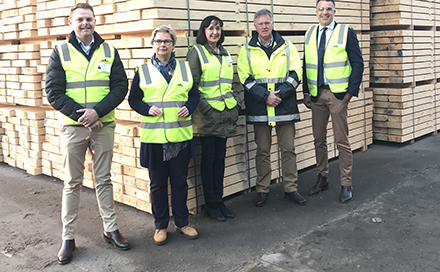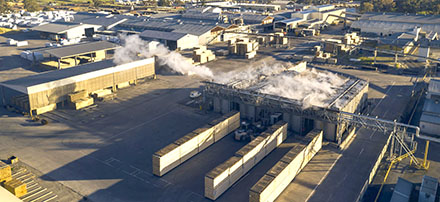
Shadow Treasurer Stephen Mullighan, Shadow Forestry Minister Clare Scriven, Deputy Leader and Shadow Minister for Environment and Water Susan Close, with NF McDonnell and Sons director and Acting GTFIH chair Ian McDonnell and Party Leader Peter Malinauskas.
The South Australian Labor Shadow Cabinet has committed to work with the Green Triangle forestry sector to realise new investment and growth opportunities following a Limestone Coast fact finding mission. Source: Timberbiz
Party leader Peter Malinauskas, Deputy Leader and Shadow Minister for Environment and Water Susan Close, Shadow Treasurer Stephen Mullighan and Limestone Coast-based Shadow Forestry Minister Clare Scriven met with key forest industry leaders at a roundtable session hosted by the Green Triangle Forest Industries Hub following a local forest and mill tour.
Participants included representation from the full breadth of the supply chain including nursery, forest, silviculture, harvest and haulage and milling.
“Today made it clear that Mount Gambier is the nation’s forestry epicentre and the opposition have walked away with a strong realisation of the opportunities that lay ahead, committing to work on a plan for the future,” GTFIH acting chair Ian McDonnell said.
He noted that the meeting highlighted the Hub’s long-term strategic objectives, which aim to increase the plantation estate by up to 200 million trees to meet growing domestic demand in coming decades.
“Achieving this plan means access to water – it is the lever to enable all growth across the Green Triangle,” Mr McDonnell said.
“The Hub presented its proposal for a water plan which will explore forestry water use and identify realistic strategies to stop water wastage by utilising water from the drainage network.
“There is more than 110 gigalitres of water that flows to the sea from the Lower Limestone Coast drain network which could support the expansion of the plantation estate and other important agricultural sectors such as vignerons, dairy farmers and potato growers who are all also facing barriers to water access. This water can also be used to support groundwater dependent ecosystems.
“The party was keen to learn of this innovative work and other proposals which our industry has earmarked to future proof its operations. It further highlighted the invaluable role of Forest Research Mount Gambier which is undertaking world-leading research into how to future-proof the sector.”
Discussion also explored opportunities for greater cross border harmonisation, particularly in fire management and training, freight movements and communication.
“The party lent its support to aid our sector to navigate the current COVID cross border issues which have greatly impaired business, like many other sectors, at this time,” Mr McDonnell said.
“It was well understood that this region is unique given the supply chain dependence on either side of the border, highlighting the need for a long-term strategic approach to ensure business continuity.”
OneFortyOne Australia Executive General Manager Cameron MacDonald said he would be looking to understand more about the Labor Party’s policy intentions in regard to carbon and climate change, noting that the New Zealand government’s recent ‘Building for Climate Change’ announcement identified a change in construction materials as one way to reduce the carbon footprint of NZ buildings to combat climate change.
“The obvious choice for this is timber, since it locks up carbon and we believe there is scope for something similar here in SA,” he said.
Mr MacDonald said water was another environmental issue the company was keen to discuss.
“We note that the Lower Limestone Coast Water Allocation Plan, amended in June 2019, heavily relies on ground water modelling that uses 2004 data,” he said.
“Under the proposed reductions, other water users were required to reduce their allocation over a period with reductions implemented every second year, but forest growers were required to implement reductions every year as plantations were clearfelled.
“The forest industry appears to have taken up a greater proportion of the reduction than other users.”
Mr MacDonald said it was important MPs understood the unique nature of a cross-border community and required careful consideration regarding COVID-19-related border restrictions.
“The ability for border communities to cross the border openly underpins the economy in the Green Triangle,” he said.
“Fire risk will be another key topic for discussion in our meeting with the Labor Party because a key point in our submission to the independent review into South Australia’s 2019-20 bushfire season was that stronger prevention restrictions and measures will complement our fire suppression capability.
“This will ensure climatic and environmental conditions are not exacerbated by intentional or negligent human acts.
“Linked to this is regional connectivity and mobile blackspots. Inadequate telecommunications infrastructure not only creates difficulty for businesses in rural and remote communities but is also a safety risk in emergency events such as bushfire.”







